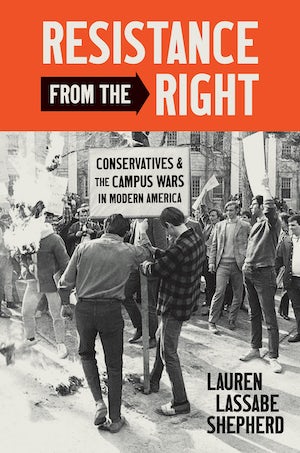To the extent this state of affairs represents a break from the past, it’s a difference of degree but not kind. Today’s overheated debates about “wokeness” and diversity and equity initiatives were yesterday’s freakouts about “trigger warnings” and “safe spaces.” The fights over “political correctness” on campus go back to at least the 1980s, deplatforming to at least the 1970s. Politicians have been whining about whining students for decades. Elders have been decrying the young as insufficiently respectful of tradition since time immemorial. The bizarre collegiate focus of politics, in other words, is nothing new.
Yet according to the historian Lauren Lassabe Shepherd, something did change in the late 1960s. At a time usually associated with leftist protest and explosions (figurative and literal) of radical potential, conservatives on campus began organizing. Out of their efforts emerged not merely a collection of now-familiar Republican luminaries — Newt Gingrich, Bill Barr, Jeff Sessions, and Karl Rove — but a novel set of tactics and a distinctly authoritarian sensibility.
As Shepherd depicts in Resistance From the Right: Conservatives and the Campus Wars in Modern America, just as left-wing students arrived on campus and soon became radicalized, right-wing students underwent a parallel but distinct trajectory. They became (or revealed themselves to be) reactionaries, committed not so much to ideology as to opposition.
Shepherd’s is a sobering and rigorous work of history, one with significant ramifications for the present. After graduating from college, Shepherd’s protagonists were not content to leave their collegiate activism in the past. Instead, they helped to remake American politics, inaugurating the New Right and all that followed in its wake, heralding what Shepherd calls a “pivot toward punishment and violence.”
“Know your enemy,” goes the old maxim, as well as the title of a deservedly beloved left-wing podcast about the American right. There is, of course, a risk of overintellectualizing the modern right, of lavishing attention on its leaders at the expense of its masses, of romanticizing its avatars like the biographer falling in love with a malevolent subject. But ignorance is no way to defeat the far-right threat. To better understand the political battlefield, we must look to one of its most durable training grounds: the college campus.
Responding to an Existential Threat
Fittingly, Shepherd’s book begins with an occurrence that many wrongly depict as uniquely characteristic of today’s political climate: college students shouting down a conservative speaker.
The year was 1967. The setting, Dartmouth College. The arch-segregationist ex-governor of Alabama, George Wallace, was on campus to give a speech, but activists chanting “Wallace, racist” shouted him down. After students stormed the auditorium’s center aisle, Wallace fled the college, later sarcastically telling a reporter, “That’s academic freedom.”
